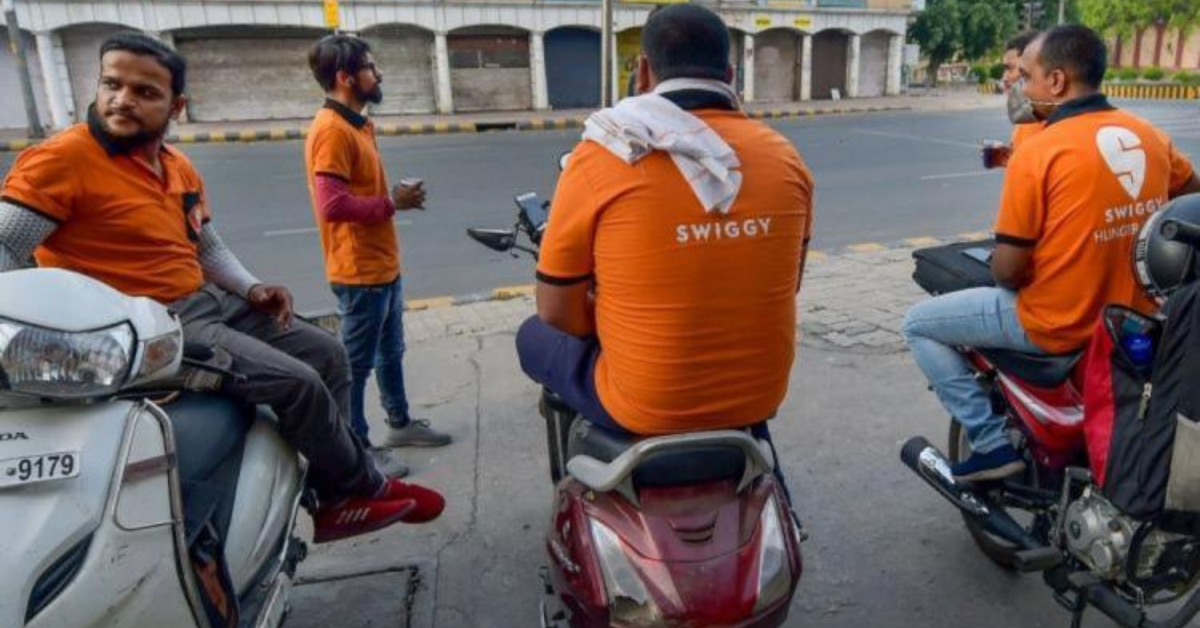Swiggy’s delivery executives in Bengaluru were on strike since last week over a host of issues
The strike ended on Monday after Swiggy sought one-week’s time to address the grievances of the executives
One of the associations supporting the protests said that the executives’ demands are pending for a long-time, but the company has not done anything to address their “plight”
While the strike of thousands of delivery executives of foodtech startup Swiggy in Bengaluru ended on Monday (July 25), some of the associations supporting the protest have warned that they will organise a bigger strike if the startup doesn’t address their issues within a week, as promised.
The executives in Bengaluru were on strike since last week with demands ranging from increase in wages, especially for ‘out of zone’ deliveries, to not giving order assignments to third-party service providers like Shadowfax and Rapido.
The executives ended the protests after Swiggy sought a week’s time to address their grievances.
Two associations of delivery executives, who supported the strike, told Inc42 that the gig workers, who play a major role in running the business, face multiple issues, including not being considered as company employees.
They claimed that the recently changed wage rates – INR 20 per order for new executives and INR 30 per order for the experienced ones – are too low given the rising fuel price and cost of living in Bengaluru. Moreover, as per the associations, the delivery executives need to pay for their uniforms and raincoats, and Swiggy doesn’t provide them.
Besides, one of the associations said that the delivery executives have no single point of contact where they can talk about their issues.
“If a delivery executive faces any issues, the customer care number is not of much help, and no area/regional managers are available to listen to the problems. Also, if they visit the Swiggy office, the watchmen do not allow them claiming no officials are available,” said Dathathreya Raju BM, national president of Delivery Boys Welfare Association.
Shaik Salauddin, national general secretary of Indian Federation Of App-Based Transport Workers (IFAT), told Inc42, “Investors of Swiggy should see the kind of work conditions they are enabling by investing in such companies who facilitate exploitative work practices.”
The association’s demand for the delivery executives includes a minimum base pay of INR 35 per order, increase in distance pay from existing INR 6 per km to INR 10 per km, introduction of a monthly rating incentive, and end on giving order assignments to logistics startup Shadowfax and bike taxi aggregator Rapido.
“These are long-pending demands and nothing new. Swiggy’s business is improving but not the plight of the delivery executives,” Salauddin added.
According to him, about 3,000 delivery executives backed by IFAT were part of the four-day protests. Inc42 couldn’t verify the exact number independently.
Meanwhile, Swiggy in a statement said, “We have been able to address concerns around earnings and incentives and reach an amicable understanding. Delivery executives in the affected pockets of Bangalore have resumed work. We remain committed to addressing the queries of delivery executives as we jointly serve consumers.”
The working conditions of gig workers, including delivery executives, have come under scrutiny in recent times. As companies like Zomato, Zepto, Dunzo forayed into the 10-min delivery segment, a lot of questions were raised on the pressure it would put on the delivery executives.
In fact, the concerns raised by the Swiggy delivery executives are also applicable to the executives of the other delivery companies, the associations said.
Earlier in 2021, Zomato and Swiggy delivery executives protested on social media against their alleged ‘exploitation’. In 2020, different Indian cities, including Hyderabad, Noida, and Chennai, saw protests from the executives over a host of issues.
Recently, government think tank NITI Aayog called for extension of social security benefits to gig workers in the country. As per its estimates, over 7.7 Mn workers were engaged in the gig economy in 2020-21, and the number would increase to 23.5 Mn by 2029-30.










